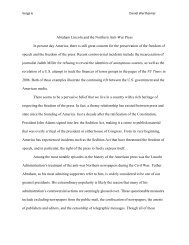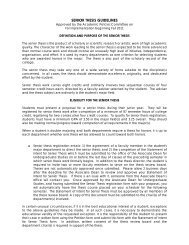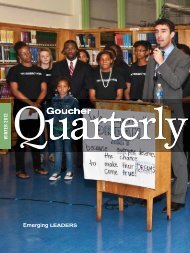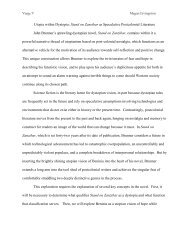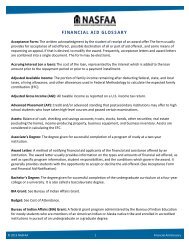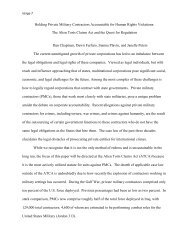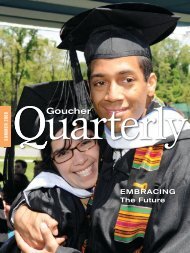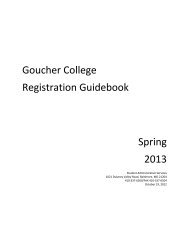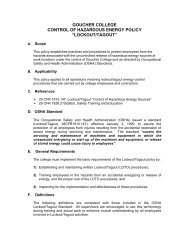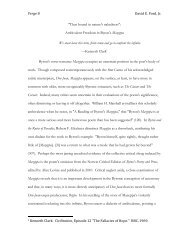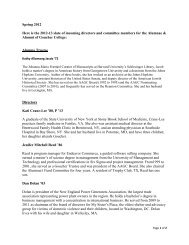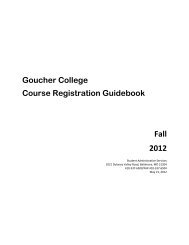SEXUAL MISCONDUCT POLICY - Goucher College
SEXUAL MISCONDUCT POLICY - Goucher College
SEXUAL MISCONDUCT POLICY - Goucher College
You also want an ePaper? Increase the reach of your titles
YUMPU automatically turns print PDFs into web optimized ePapers that Google loves.
Formal Procedure<br />
At any time, either party may end the informal<br />
process and begin a formal complaint procedure;<br />
or the process may begin with a formal complaint.<br />
The formal procedure can also be initiated if the<br />
informal procedure has been exhausted without<br />
resolution satisfactory to the person making<br />
the complaint. With limited exceptions, formal<br />
complaints must be brought within four years of<br />
the date when the misconduct is alleged to have<br />
occurred.<br />
Formal complaints may be made to the Office of<br />
Legal Counsel or to any member of a three-person<br />
panel that includes: the provost, when the accused<br />
is a faculty member; the dean of students, when the<br />
accused is a student; and the director of human<br />
resources, when the accused is a staff member.<br />
A confidential online form for reporting sexual<br />
misconduct issues is available at<br />
www.goucher.edu/sexualmisconductform.<br />
Panel members receive a report and<br />
recommendation from the investigators assigned<br />
to investigate the complaint. Upon review of that<br />
report, the panel issues a written decision that<br />
includes sanctions, if appropriate. Appeals may be<br />
made, on limited grounds, to the college president.<br />
Emergency<br />
Numbers<br />
Office of Public Safety.. . 410-337-6111 .<br />
or 6112<br />
Student Health and<br />
Counseling Services.. . 410-337-6050<br />
Reporting<br />
Sexual Assault<br />
If you believe that you are or have been the victim<br />
of sexual assault, including rape or date rape,<br />
and you need immediate assistance, contact the<br />
Office of Public Safety (410-337-6111 or 6112).<br />
The office will ensure that you receive prompt and<br />
appropriate medical attention. Please remember<br />
that it is important to receive prompt medical<br />
attention for the collection of evidence and the<br />
prevention of possible disease and/or pregnancy.<br />
Victims of sexual assault also may contact a<br />
campus consultant to assist them in the reporting<br />
and complaint process. Consultants include<br />
Raymond Green, counselor . . 410-337-6054<br />
Justin Massey, counselor .... 410-337-3023<br />
Monica Neel, psychologist ... 410-337-6562<br />
Cynthia Terry, chaplain ...... 410-337-6048<br />
Josh Snyder, rabbi .......... 410-337-6545<br />
Non-<strong>Goucher</strong> sources of support also are available,<br />
including a nearby rape crisis center, TurnAround,<br />
in Towson (410-828-6390).<br />
Confidentiality<br />
<strong>Goucher</strong> <strong>College</strong> recognizes that confidentiality<br />
is important in matters of sexual misconduct and<br />
strives to handle sexual misconduct complaints<br />
according to established procedures, which<br />
require that complaints be kept as confidential as<br />
is reasonably possible. Parties involved should not<br />
discuss their cases with anyone who does not have<br />
a legitimate need to know.<br />
<strong>SEXUAL</strong><br />
<strong>MISCONDUCT</strong><br />
<strong>POLICY</strong><br />
an information guide<br />
TurnAround ............ 410-828-6390<br />
(a rape crisis center in Towson) This guide is only a summary. The entire <strong>Goucher</strong><br />
<strong>College</strong> Sexual Misconduct Policy is available<br />
online at www.goucher.edu/misconduct/.
<strong>Goucher</strong> <strong>College</strong> commits itself to<br />
providing a community of mutual trust<br />
and respect for students, faculty, and<br />
staff. Therefore, sexual misconduct will not be<br />
tolerated. Such behavior seriously undermines<br />
the achievement of <strong>Goucher</strong>’s mission and its<br />
effectiveness as an educational institution and<br />
a workplace. Each member of the <strong>Goucher</strong><br />
<strong>College</strong> community shares a common<br />
responsibility to maintain an environment free<br />
from sexual misconduct.<br />
DEFINITIONS<br />
Sexual misconduct prohibited at <strong>Goucher</strong> <strong>College</strong><br />
includes the following:<br />
Sexual Assault<br />
Sexual assault means nonconsensual physical<br />
contact of a sexual nature. It includes rape and<br />
any other acts using force, threat, intimidation, or<br />
coercion; or using advantage gained by the victim’s<br />
inability (whether temporary or permanent) to<br />
make rational, reasonable decisions about sex, of<br />
which the accused was aware or should have been<br />
aware.<br />
Sexual Harassment<br />
Sexual harassment means unwelcome sexual<br />
advances, requests for sexual favors, and other<br />
verbal or physical conduct of a sexual nature<br />
when submission to such conduct is made a term<br />
or condition of an individual’s employment or<br />
participation in an educational program; is used as<br />
the basis for employment or academic decisions<br />
affecting an individual; or unreasonably interferes<br />
with an individual’s work or academic performance<br />
or creates an intimidating, hostile, or offensive<br />
environment on campus.<br />
Sexual Exploitation<br />
Sexual exploitation occurs when a person takes<br />
nonconsensual, unjust, or abusive sexual advantage<br />
of another person for his or her own benefit, or for<br />
the benefit of anyone other than the person being<br />
exploited.<br />
Consensual Relationships<br />
Between Students, Faculty, and<br />
Staff<br />
<strong>Goucher</strong> <strong>College</strong> prohibits consensual sexual or<br />
intimate relationships between faculty and students,<br />
and between staff and students. Such relationships<br />
are also prohibited between college employees<br />
when one of the individuals involved has direct<br />
professional influence or direct authority over the<br />
other.<br />
Direct professional influence or direct authority<br />
exists when an individual supervises or evaluates<br />
the performance of a faculty or staff member, or<br />
recommends or awards salary, reappointment,<br />
promotion, or tenure of the faculty or staff member.<br />
When direct professional influence or direct<br />
authority exists or develops between individuals<br />
who are involved in a consensual sexual or intimate<br />
relationship, the person with power or authority<br />
must report the existence of the relationship to<br />
the provost or the director of human resources,<br />
who must take immediate steps to eliminate the<br />
influence or authority. Failure to self-report might<br />
result in sanctions.<br />
Consent<br />
Consent is expressed in explicit words, and<br />
means willingly and knowingly agreeing to<br />
engage in mutually understood sexual conduct.<br />
Consent must be mutual and ongoing, offered<br />
freely and knowingly, and cannot be given by a<br />
person who is incapacitated by drugs, alcohol,<br />
or other physical or mental impairment, or by<br />
being threatened, intimidated, or coerced.<br />
COMPLAINT<br />
PROCEDURES<br />
Any person who feels that he or she has been<br />
subjected to sexual misconduct may use informal or<br />
formal complaint procedures. In situations in which<br />
a person does not wish to come forward or pursue<br />
a complaint, the college will do all it can to respect<br />
the person’s wishes, but may proceed to address<br />
the allegations, especially when the circumstances<br />
present a threat of harm or injury to the person or to<br />
other members of the community.<br />
Informal Procedure<br />
In many cases of sexual misconduct, informal<br />
actions that will effectively stop the behavior can be<br />
taken.<br />
As a first step, a person may confront the offender<br />
and make clear that the behavior is offensive and<br />
that the person does not want any further incidents<br />
to occur.<br />
If this does not stop the misconduct, or if the<br />
person does not want to confront the offender or<br />
needs help in doing so, the behavior should be<br />
reported to any of the following administrators:<br />
• the provost or associate dean for faculty<br />
affairs, when the accused is a faculty<br />
member;<br />
• the dean of students or assistant dean for<br />
community living, when the accused is a<br />
student;<br />
• the director of human resources, when the<br />
accused is a staff member; or<br />
• the director of public safety.<br />
The administrator can provide the person with<br />
support and advice, intervene directly with the<br />
accused, attempt to mediate a solution, and/or<br />
impose remedial action.



